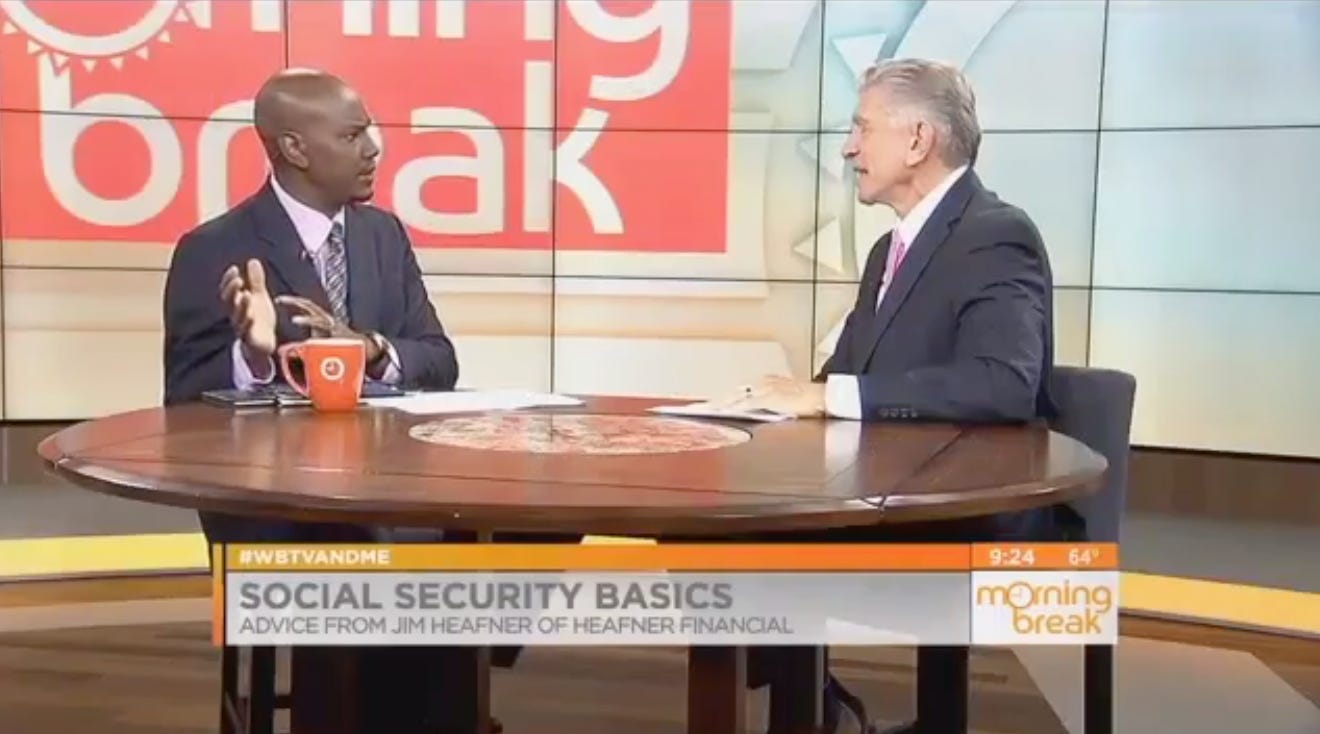Fooled by ads that look like news
Deceptive ads on Charlotte TV and radio? Local media are pushing the limits of sponsored content, new lawsuit suggests
In a new lawsuit, nine investors who collectively lost hundreds of thousands of dollars in retirement savings say they entrusted their money to financial adviser Jim Heafner after learning about him from his appearances on Charlotte TV and radio stations.
In many cases, the victims — all in their 50s and 60s — believed Heafner had been invited on the programs because of his financial expertise, and they trusted the hosts of the programs and the solid reputation of the stations. In reality, though, the segments featuring Heafner were often paid ads that resembled news segments.
“My clients’ allegations are that at the time that they were viewing those appearances, they were not aware that he was appearing in an advertisement but believed he was an invited-on expert,” said Chicago lawyer Adam Marquardt, in an interview with The Ledger.
Why it matters: The distinction between advertising and editorial content is important because viewers might have been less likely to hire Heafner if they knew his segments were paid ads. In addition, the Federal Trade Commission has held that “advertising and promotional messages that are not identifiable as advertising to consumers are deceptive if they mislead consumers into believing they are independent, impartial, or not from the sponsoring advertiser itself.”
In the lawsuit, all nine say they learned about Heafner from his appearances on WBT radio or WBTV, although he also appeared in recent years in segments on WCNC and WSOC.

Background: The suit, filed against Heafner and the brokerage he affiliated with, Georgia-based Retirement Wealth Advisors, is the latest legal action stemming from investments in a Florida company called 1 Global. Heafner recommended that many of his clients invest retirement savings in the company, and the suit says he told clients to expect a 9% annual rate of return. However, the Securities and Exchange Commission later alleged 1 Global mismanaged or misallocated the money, and it filed for bankruptcy protection. That caused many of Heafner’s clients to lose a lot of money — though they will recoup a portion of it in the bankruptcy process.
As you might expect, the case has turned into a legal mess: Heafner says 1 Global appeared to be a solid investment, that its implosion was unforeseeable and that even he lost money in it. Lawyers for his clients say he missed red flags and had no business recommending such a risky investment to people at or approaching retirement age. The industry’s regulatory body sanctioned Heafner, and he has been the subject of several complaints from former clients.
Media was #1 source: Heafner, in an interview with The Ledger in September, said the media was the top source of new clients. He added: “In most businesses, the biggest challenge is distinguishing yourself from somebody else. … Marketing is really an important thing in the business. I think I did a pretty good job of it.”
Although most people probably think of TV commercials as the 30-second spots that allow you to go to the bathroom or do errands around the house while you wait for your program to return, many viewers might not realize that most Charlotte TV stations now have programs that blur the line between ordinary programming and ads by allowing advertisers to buy time on programs in ways that don’t look like traditional advertising. It’s known as “sponsored content,” or sometimes derisively as “pay to play.” If you watch some of these programs, you’ll see long segments that companies have paid for to promote products in healthcare, financial services and home improvement. [Updated 2/3/2010 6:50am]
Selling ‘Charlotte Today’: For instance, a promotional flier for WCNC’s “Charlotte Today” obtained by The Ledger shows the station is promoting the program hosted by Eugene Robinson and Colleen Odegaard as providing “Solutions for Your Unique Business Needs” at a cost of $1,995 per segment with a three-segment minimum:

In a “Charlotte Today” segment still available online, Robinson and Odegaard interview Heafner for 4 minutes and 45 seconds, and Odegaard — a former news anchor at the station — tells viewers “you need to work with a trusted financial professional like Jim Heafner — call him!” The only indication that it’s a paid ad is a note at the bottom of the screen for the first 7 seconds of the segment that says “Sponsored by Heafner Financial.” It also includes Heafner Financial’s phone number on the screen.
Sponsored content at WBTV: In WBTV’s case, when the news broke in March about Heafner’s connection to 1 Global, the station ran an article with the disclaimer that the financial adviser appeared “as paid, sponsored content. The segment was labeled that way in the show and in credits.”
That appears to be not entirely true. A 4-minute, 6-second Heafner appearance on WBTV’s “Morning Break” from 2017 that is available online gives no indication it’s a paid ad. The station renamed the show “QC Morning” last year and said it would “continue delivering a mix of editorial and sponsored content.”
Studio name at WBT: Heafner appearances on WBT radio don’t appear to be available online. But an article on the station’s website says “WBT marked its growing relationship with Heafner Financial by naming the historic studio the WBT Heafner Financial Studios.” The July 2018 ceremony was marked on-air with two news hosts and “finished with a cake to officially announce the new studio naming.” In the lawsuit, a couple who lost $250,000 in 1 Global said “they recall [Heafner’s] tagline and WBT hosts endorsing him as a retirement specialist.”
Ledger’s take: Media shouldn’t be held responsible for the actions of their advertisers. But they should be held responsible for making sure their readers, viewers or listeners know that advertisers are advertisers.
Matt Hanlon, market manager for WBT parent company Entercom, said in an interview that he believes listeners can distinguish between paid and editorial content. Many of WBT’s weekend programs are sponsored, and that information is “right on the website — you can see which ones are and which one are not,” he said. [Updated 1/29/2020, 3:44 p.m., to include Hanlon comments]
WBTV’s station manager, Scott Dempsey, didn’t return an email on Tuesday.
According to the lawsuit, the nine plaintiffs include a retired funeral-services company worker, an unemployed engineer and his restaurant-manager wife and a retired teacher. Heafner steered each of them to invest between $94,000 and $250,000 in 1 Global, the suit says.
One of them, a 66-year-old Duke Energy worker who heard about Heafner from WBT, made an appointment after seeing him on WBTV, “as [he] believed the longest running Charlotte station would invite on trusted experts.”
Learn more: Read the full lawsuit on The Ledger’s website.
This article appeared in the Jan. 29, 2020, edition of The Charlotte Ledger.

